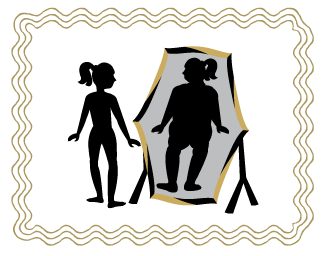Parents’ Guide to Eating Disorders
It is not unusual for mealtimes to be a source of anxiety in busy everyday family life. Children go through phases when it comes to eating, so it can be difficult for parents to decide what is normal and what is not.
For example, a toddler that was once a ‘good eater’ may become a ‘fussy eater’ overnight, or a preschooler might suddenly decide to only eat toast, chips, bananas and cheese slices. There are many variations in normal eating behaviour among children and young people. Some eating patterns that cause a lot of worry are entirely normal and resolve themselves with little input.
About eating disorders
Eating disorders cover a range of mental health illnesses. People with eating disorders have a distorted negative view of themselves. They have an abnormal relationship with food and a genuine fear of becoming fat. Their all-consuming focus on weight and body shape is damaging to their mental and physical health.
Eating disorders are a way of coping with difficult feelings and emotions. Having an eating disorder is not about wanting to look like a skinny celebrity.
Eating disorders are common. They are more common in teenagers but can occur in anyone, male or female, at any age.
The two major eating disorders are anorexia nervosa and bulimia nervosa. You can have symptoms of both, or even move from one disorder to the other.
Anorexia
Someone with anorexia believes she is overweight even when she is extremely underweight. She will severely restrict her calorie intake to keep her weight low. Her menstrual periods tend to stop. Some people with anorexia exercise endlessly to burn off calories.
On average, anorexia starts in the early teenage years, though children as young as six or seven may be affected. At least one teenage girl in every 150 is affected, and at least one teenage boy in every 1000 is affected.
Bulimia
A person with bulimia will binge eat and feel as if she has lost control. Bingeing means she will consume enormous quantities of food in one sitting. After bingeing, she is likely to feel sick and bloated and disgusted with herself. These feelings lead to purging in order to get rid of the food. She will make herself vomit (purge herself), or sometimes use laxatives to help get rid of food. She is likely to be within the normal weight range for her age and height, or be a bit overweight.
Bulimia tends to start in the mid-teens, which is a little later than for anorexia. Approximately four out of every 100 women will suffer from bulimia at some point. Bulimia is much rarer in males than anorexia.
Does my child have an eating disorder? What should I be watching for?
Does your child get touchy if you mention eating? She may claim to have already eaten with friends, or say she isn’t hungry, or that she prefers eating alone (after the rest of the family have eaten).
Does she get distressed at the amount of food you put onto her plate? Does she take a long time to eat? Does the food on her plate look as if it has been rearranged rather than eaten? Does she leave the table during meals? Or does she go to the bathroom immediately after meals?
Has your child gone on a diet, for no apparent reason? Dieting is common in teenage girls, but most will stop dieting once they have lost a bit of weight, or once they have grown fed up with the diet.
Has your child suddenly announced she is a vegetarian or a vegan? This type of dietary change can be fine, particularly if your child shows willingness to eat vegetarian/vegan alternatives instead. But be wary if she seems to have created an excuse for cutting out food altogether.
Behaviour away from the dining table may include weighing herself a lot, spending a lot of time in the bathroom, or participating in sporting and physical activities she was never interested in before, particularly solitary exercise.
Look for changes in your child’s behaviour. Perhaps she has become more introverted and more secretive, or perhaps she has started to wear baggy clothing.
However, you may never come across anything to arouse your suspicions. Your child’s feelings and abnormal food behaviour may stay well hidden for a long time before eventual discovery. It can be a huge shock for parents to discover that their child can be so secretive.
How should I broach the subject with my child, if I believe she has an eating disorder?
In general, a person with an eating disorder will deny having a problem.
Your child may react with anger and hostility if she feels you are ‘accusing’ her of having an eating disorder. This can be difficult to deal with. Don’t give up but don’t push. It may take several attempts before you manage to have a discussion. Your child’s feelings and emotions have been kept hidden for so long, that it can be difficult for her to talk openly. Continue to express your concerns, continue to offer your help, and continue to let her know she is loved and valued.
Encourage her to come with you for an appointment with her paediatrician (or usual doctor if she is over eighteen). Not all doctors will have enough specialist knowledge of eating disorders to be able to help your child directly, but they can direct you to other health professionals (child psychiatrist, psychologist, etc.) or to a specific eating disorders service.
Most doctors will listen to you and your child, and seek to refer as appropriate. However, be prepared. A few doctors may feel it is just a phase, something your child will grow out of it. You may need to be persistent to get further advice or treatment.
What treatments are there for eating disorders?
For very sick people with severe physical problems who need medical monitoring or urgent re-feeding, care as an in-patient is vital.
Many of those with eating disorders will need input such as individual psychological therapy, together with help getting back to a healthy way of eating. Others may manage to recover via support groups. Sometimes medications are used, for example in certain cases of bulimia.
When a child has an eating disorder, family therapy may be proposed.
The recovery process from an eating disorder is long and complicated. Your child will need to give up her deeply entrenched beliefs, maintain a healthy weight, and deal with numerous emotional struggles. It is a mammoth task for all involved.
Can people with eating disorders recover to lead a normal life?
It is difficult to give clear-cut figures on recovery from eating disorders, partly because many sufferers of eating disorders never get formally diagnosed or treated.
With treatment, it can take an average of six years for someone with anorexia to recover. Around 40% of those with anorexia will recover completely and lead normal lives. 30% will improve – they will remain troubled by anorexia, but will be able to get on with their lives reasonably well. 20% will remain ill with anorexia and will not recover. Sadly, around 5% of sufferers of anorexia will die (from suicide or from medical complications caused by anorexia).
With treatment, around 50% of people with bulimia will recover well. 30% will recover partially, but will continue to suffer relapses. 20% will not recover and will remain ill with bulimia.
Eating disorders can cause many physical consequences. Examples include reduced muscle strength, abnormal heart rhythms, blood circulation problems, shrinking of the ovaries, and dental problems (e.g. tooth enamel damaged by acid that has been vomited up from the stomach). Many physical problems will improve on recovering from the eating disorder. But some conditions such as damage to the heart or the kidneys, or weakening of the bones, may not be totally reversible.
What causes eating disorders?
If your child has an eating disorder, it is important to realise that she did not choose to have an eating disorder. It is also important to note that eating disorders are not caused by you, the parents.
There is no single factor that causes eating disorders.
Numerous factors have been suggested that may make your child more likely to develop an eating disorder. These include the following: those with low self-worth and low confidence, those who are perfectionists and set themselves hard-to-achieve standards, enduring a major upheaval (such as moving school or a family break up), experiencing the death of a special person, being a victim of physical or sexual abuse, being bullied about your appearance, dealing with academic pressures, dealing with the difficulties of puberty and growing up.
However, none of these factors are actual causes. At present, there is ongoing research into various genetic factors and biological factors and how they influence eating disorders.
Can anything be done to prevent eating disorders?
Whether eating disorders can be prevented or not by specific interventions is unknown. There is no current evidence that shows you can actually prevent an eating disorder from developing. Ultimately, an eating disorder is a mental illness that helps the sufferer cope with issues and emotions that are too difficult or painful to be faced.
What are your experiences of parenting a child with an eating disorder?
Do you have any experiences you are able share? How have you coped/ are you coping? Which treatments or therapies have helped your family? What do you wish you had known about earlier? What difficulties have you dealt with?
All comments are welcomed.
Note: I have used ‘she’ throughout this article for consistency and because eating disorders are more common in females. Nevertheless, eating disorders are equally important in males.
Useful eating disorders websites:
http://www.b-eat.co.uk/ UK-based Organisation
https://www.allianceforeatingdisorders.com/portal/ USA-based organisation
http://www.boulimie-anorexie.ch/ The ABA (L’Association Boulimie Anorexie/ Anorexia Bulimia Association) Based in Lausanne, website in French Provides info on support groups Gives addresses for specialist eating disorders services in Bern, Fribourg, Geneva, Neuchâtel, Valais and Vaud
http://aes.ch/ The AES (Arbeitsgemeinschaft Ess-Störungen/Association of Eating Disorders) Based in Zurich, website in German Provides links for organisations around Switzerland that deal with eating disorders Gives addresses for specialist eating disorders centres e.g. in Basel, Bern, Schaffhausen, Zug, and Zurich
Disclaimer: This article is not a substitute for the medical and psychological evaluation and treatment of your child. Eating disorders can kill and may need urgent medical help.
By Dr Jahura Hossain
Born and brought up in London, Jahura is a U.K.-qualified doctor. She has worked in hospitals, general practice, public health, prison medicine, and the pharmaceutical industry. She has also worked in a specialist eating disorders unit for young people.
© Copyright. Jahura Hossain. 2013. All rights reserved. No part of this article may be reproduced without the express consent of the author.
Illustration by Jen Bognar





Dear Dr Jahura Hossain
I am surprised to see there is no comment to the above. I am looking for information, association, groups etc. for people with eating disorders – especially Bulimia. I suffered myself seriously for about 10-12 years over 20 years ago. Today, I have a very strong desire to assist girls (or boys) who are now living the “hell” that I went through all those years ago. I live in Zurich area.
best regards
Rannveig
Dear Rannveig, Thanks a lot for your comment and for having the courage to talk about it now.
As for a group to assist children with eating disorders, there are two Swiss groups listed above. One has the information in French and one in German, which is the Zurich-based one.
Here is another useful article on the topic. Within it the Zurich University Hospital is mentioned. Perhaps that’s a good place to start?
http://www.swissinfo.ch/eng/obsessed-with-food_treating-eating-disorders-in-switzerland/33657974
Maybe later you can let us know how you get on. All the very best.
We are going through this hell now with our 18year old daughter – she has been hospitalized but is back home -however still bingeing and purging. The situation is destroying our family. Any help or advice would be greatly appreciated.
Dear Linda,
So very sorry to hear that. It must be very stressful for you all.
I don’t know where you are but in the article above are links to both UK and US websites dealing with this topic. If you’re in Switzerland there is a link to two Swiss groups, one is in French, the other is in German.
There are a number of support groups on Facebook too. It would be best if you did a search for one that suits your needs.
Presumably you have spoken with a psychologist. If you need names of English-speaking counsellors in Switzerland, I can send you some. Email: info@motheringmatters.ch
Wishing you, your family and of course your daughter all the very best as you deal with this.